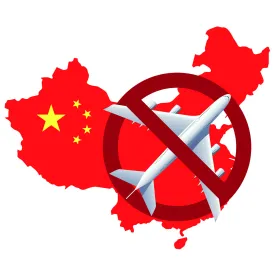The number of PRC residents ill with the coronavirus is trending down and the PRC economy is again starting up. Nonetheless, companies in China are confronting challenges as they do that, both operational and legal.
Employment Matters
Since the outbreak of severe acute respiratory syndrome coronavirus 2 (“COVID-19 virus”) and the adoption of response measures by government authorities at national, provincial, and municipal levels, manufacturers have probably most focused on employment issues, such as the resumption of work, levels of compensation, and, sometimes, layoff options. Over the past six weeks, PRC authorities at the national and local levels have issued guidance for employers with respect to the resumption of work and the entitlements of employees. On January 24, 2020, the Ministry of Human Resources and Social Security issued the Notice on Labor Relations under the COVID-19 Situation (the “Labor Notice”) 人力资源社会 保障部办公厅关于妥善处理新型冠状病毒感染的肺炎疫情防 控期间劳动关系问题的通知, which includes the following measures:
• Any employee who is infected by the COVID-19 virus, as well as any employee suspected to be so infected, and any employee in close contact with such a person, and any other employee not able to work as a result of the government’s implementation of isolation measures or other emergency measures, is entitled to normal salary payment during the isolation or medical observation period. In addition, the employer is prohibited from terminating any such person’s employment contract in accordance with Articles 40 and 41 of the PRC Labor Contract Law, which provisions deal with an employer’s right to terminate unilaterally for reason other than “cause”.
• Further, in the event a labor contract expires during any such period, such contract must be extended until the expiration of the medical period, isolation period, medical observation period or the end of the isolation or emergency measure taken by the government.
The Labor Notice also stipulates the following with respect to employee entitlements during the present circumstances:
• In case of any difficulty in business operations as a result of the COVID-19 virus, the employer may negotiate with the employee to reach an agreement regarding salary adjustment, adjustment of position and rest days, or any reduction in work hours designed to maintain headcount, either in order to avoid a lay-off or to minimize the scale of any lay-off.
• For any shutdown caused by circumstances related to COVID-19 within one salary payment cycle, employees must be deemed to be working as normal and be entitled to their normal salary. If the shutdown period exceeds one salary payment cycle, then for employees who actually work, their salary must at least be the local minimum salary; for employees who do not work, the employer must pay a subsidy to the employee, the standard of which is determined by the local government of each province. For example, in Shanghai, the subsidy must be no less than the local minimum salary standard; in some cities in Zhejiang, the subsidy standard is 80% of the local minimum salary.
• In addition to the above, some local governments have specified further requirements, including directing employers to provide employees with appropriate janitorial and sanitation supplies following the resumption of work, encouraging employees to use annual leave or to adjust rest days if the employees are unable to return to work in order to enable them to receive the normal salary. The above policies affirm that government authorities in the PRC are trying to minimize the risk of mass layoff and to protect the salary and other interests of the employees. At the same time, however, the government has with these policies recognized that some employers will need to reduce their employee obligations to adapt to the present conditions.
Force Majeure
PRC law defines force majeure as an unforeseeable, unavoidable and irresistible objective condition, but there is no clear guidance under the laws on what specific events will be accepted as force majeure. The Shanghai Superior Court, the highest court in Shanghai, has recently issued A Series of Questions and Answers on the Legal Application on COVID-19 Cases (the Q&A) 关于涉新冠肺炎疫情案件法律适 用问题的系列问答, which provides that, if a contract cannot be performed due to any government action that has been taken to prevent or control the spread of the COVID-19 virus, then those circumstances may constitute a force majeure event that was unpredictable, unavoidable and irresistible. This suggests that the COVID-19 virus would not trigger a force majeure event in every contract. Further, most legal practitioners believe that the occurrence of the COVID-19 virus alone will not constitute a force majeure if the contract in question may still be performed, unless the applicable government authority has prohibited the performance of the contract, at least during the virus period.
Similarly, when PRC courts were determining whether the circumstances arising in connection with the Severe Acute Respiratory Syndrome (“SARS”) in 2003 would constitute a force majeure event, the applicable courts determined on a case-by-case basis whether the party claiming force majeure could still perform its obligations. For example, SARS was considered to constitute a force majeure for the general contractor in the context of a construction contract, whereas substantially similar circumstances were determined not to constitute a force majeure in the context of a lease contract where the lessee’s obligation was to pay rent. From our examination of case precedent, we find that PRC courts are generally reluctant to conclude that the circumstances arising in the context of a recognized epidemic constitute a force majeure event under contracts where the principal or only obligation is one of payment.
According to the Q&A, the period when a force majeure event may be asserted to have occurred due to a governmental order or actions should commence on and from the date when the provincial government where the contract is to be performed or where the parties are domiciled determines to start the response system to deal with a major public health emergency (重大突发公共卫生事件响应) and should end on the date when the government halts such response system. We can assist companies in determining such dates, depending upon the particular facts.
Also, be aware that, even if a force majeure has occurred, Article 117 of the PRC Contract Law provides that a release of liabilities may occur only if the underlying contract may no longer be performed as a result of the force majeure. Absent that, the force majeure will result only in an extension of the time for performance or a reduction in a portion of an obligation based on principles of fairness, not the excuse of performance in its entirety.
The fairness principle normally applies when there is an unexpected change of situation other than a force majeure event. The principles of fairness and situation change, unlike force majeure, have not been specified in any statute, but arise from interpretations of the PRC Supreme Court and have been applied nationwide.
According to the Second Interpretation of the Supreme People’s Court on Several Issues concerning the Application of PRC Contract Law最高人民法院《关于适用(中华人民 共和国合同法)若干问题的解释(二)》, if the continuing performance of a contract is obviously unfair to one party due to a major change that is unforeseeable at the time of execution and not caused by force majeure and not a commercial risk, such party may request the court to modify or terminate the contract. The court will then determine whether to change or terminate the contract in accordance with such principle of fairness, depending on the particular situation of the case.
Likewise, the Q&A advises that, if the COVID-19 virus does not constitute a force majeure event under the contract, courts could rely on the principle of situation change to judge the cases if the performance of such contract is apparently unfair to a party due to the COVID-19 circumstances. Further under the Q&A, the rent under a commercial lease may be adjusted, as appropriate, based on the fairness principle if there is a significant decrease in the lessee’s revenue as a result. In addition to the Q&A, the Shanghai Superior Court published guidance in February on how to judge cases during the COVID-19 period. According to this guidance, if the performance of a contract would significantly impact the rights and interests of a party, then the court should make appropriate judgment based on the principles of fairness and good faith, taking into account the agreement between the parties and the relationship between the virus situation and the failure to perform the contract or the difficulty of performance.
Similarly, during the SARS period, the PRC Supreme Court published guidance advising the courts to judge cases based on the fairness principle if the continuing performance of a contract would significantly impair the rights and interests of a party. Courts throughout China have ruled in favor of the reduction or release of rent for certain months during the SARS period based on principles of fairness and situation change.
Notably, PRC courts were generally conservative in concluding that an event constitutes a major change of situation triggering the application of the principle of fairness. According to a judicial interpretation of the PRC Supreme People’s Court in 2009, any such conclusion of local courts was required to be reported to and reviewed by the applicable superior courts. It remains to be clarified whether such requirement is applicable to cases involving the Corona Virus.
Data Privacy Issues
Since the COVID-19 virus began its spread in China, most companies are requesting and collecting information on the travel history and health of their employees. This section provides general guidance on whether and how a company may collect such information from its employees.
May Companies Collect Travel and Health Information of Employees During the COVID-19 Period?
According to Article 8 of PRC Labor Contract Law (2013) 中华人民共和国劳动合同法, companies have the right to gather from the employees information directly related to their labor contracts, such as the name, address and contact information. However, an employee’s travel history and health information are deemed not relevant to such contracts. Therefore, employers normally have no right to collect such information from their employees.
However, during the COVID-19 period, companies not only have the right, but also the obligation to collect such information, as long as it is COVID-19-related. According to the PRC Law on Prevention and Treatment of Infectious Diseases (2013)中华人民共和国传染病防治法 and the Emergency Regulations on Public Health Emergencies (2011) 突发公共卫生事件应急条例, all entities and persons are obliged to cooperate with the state to prevent and control the virus. Companies must timely and accurately report the condition of any person with, or suspected of having, any infectious disease. Additionally, all companies must establish a safety management system, as required by PRC Emergency Response Law (2007)中华人民共和国突发事件应 对法, learning the situation that may damage the public safety and reporting such situation to the applicable government agencies. In order to fulfill the foregoing obligations, we consider that companies may collect from their employees such information related to the disease or emergency, even if such information has no relevance for their labor contracts.
In addition, after the outbreak of the COVID-19 virus, many local governments have implemented emergency actions that require employers to monitor the health status of their employees and collect employees’ health information and travel history. For example, the Shanghai government mentioned in a notice that companies must request their employees to report their health status every day and monitor their body temperature.1 Similarly, Beijing and Guangdong require companies there to collect the travel history of their employees before they resume work and to monitor their health status every day. The Beijing Lawyer Association also specified in a Q&A that employers may collect employees’ information related to the prevention and control of the COVID-19 virus, as required by any applicable government, including, without limitation, their addresses, travel histories and health information.2
How Should the Companies Collect, Use and Store the Travel and Health Information?
First, health and travel information both fall within the scope of personal information. According to the Information Security Technology: Personal Information Security Specifications (2018)信息安全技术: 个人信息安全规范, personal information includes “a variety of information recorded electronically or otherwise that, alone or in combination with other information, can identify the identity of a specific natural person or reflect the activities of a specific natural person.” Technically, the name, birth date, address, contact information, health information and travel history are all personal information.
The collection of personal information, as required by the PRC Cybersecurity Law (2017) 中华人民共和国网络安全 法, should (i) follow the principles of legitimacy, properness and necessity, and (ii) be known and agreed by the subject person. We list below what we consider best practices for collecting, processing and storing such personal information.
• Do not compel an employee to provide any personal information. As previously noted, companies may be required to collect personal information relevant to COVID-19, but the collection of such information still needs to be agreed by the subject person. Therefore, if an employee refuses to provide such information, the employer should not force the person to provide it. Further, the Office of the Central Cybersecurity and Informatization Commission provides in a notice (“Notice”) that, other than the entities authorized by the National Health Department, any other entity or person should not collect personal information on the grounds of virus prevention, control and curing, unless agreed by the subject person.3 Therefore, unless the company has been authorized, or requested by the National Health Department to collect COVID-19-related information from employees, they should not force an employee to provide any such information if the employee refuses to do so.
• Do not collect any personal information not relevant to the prevention and control of the COVID-19. As required by the PRC Cybersecurity Law, the scope of the personal information being collected should follow the de minimis rule. In the case of COVID-19, such personal information must be limited to that relevant to the prevention and control of the virus, which, for example, could include the contact details, travel history within the last 14 days and the health status of employees. Companies should avoid collecting any irrelevant travel information or family relationship information or asking for health check reports from employees.
• Do not collect or use any personal information for other purposes. The Notice prohibits the use of any personal information collected for purposes of combatting the COVID-19 virus for any purpose other than preventing and controlling the virus. Therefore, companies should strictly manage the use of the collected personal information and avoid using such information for any other unauthorized purpose.
• Do not disclose any personal information to third parties other than the institutions authorized to collect such information. According to the PRC Cybersecurity Law, unless agreed by the subject person, companies should not disclose personal information to any third party. Likewise, the PRC Law on Prevention and Treatment of Infectious Diseases specifies that companies should not intentionally disclose any privacy information of the infectious disease patients, suspected infectious patients and their close contacts. The Notice also prohibits any entity or person from disclosing personal information, such as the name, age, identification card number, telephone number, or home address of the subject person, unless agreed by such person or such information has been desensitized.
• Use secured technology to store the personal information. Both the PRC Cybersecurity Law and the Notice require that all persons collecting or managing personal information use secured technology to protect such information from being disclosed or stolen. Also, when the COVID-19 virus ceases to be a concern, we suggest companies delete the personal information that has been collected during this period and no longer needs to be retained. What Should Companies Do If an Employee Intentionally Conceals Information Relevant to the COVID-19 Virus? As previously discussed, companies should not force an employee to provide any personal information, even if such information is related to the COVID-19 virus. If an employee refuses to provide personal virus-related information, companies may consider reporting the same to the applicable health authorities for their investigation. In addition, if an employee refuses to provide relevant information or provides false health information and is later confirmed to have the virus, causing other employees to be quarantined or infected with the virus, such employee may be subjected to criminal penalties for intentionally spreading the virus and impairing public safety. In such case, the employer may unilaterally terminate the employee’s labor contract without paying severance, in accordance with Article 39 of the PRC Labor Contract Law.
What Should Companies Do If an Employee Intentionally Conceals Information Relevant to the COVID-19 Virus?
As previously discussed, companies should not force an employee to provide any personal information, even if such information is related to the COVID-19 virus. If an employee refuses to provide personal virus-related information, companies may consider reporting the same to the applicable health authorities for their investigation. In addition, if an employee refuses to provide relevant information or provides false health information and is later confirmed to have the virus, causing other employees to be quarantined or infected with the virus, such employee may be subjected to criminal penalties for intentionally spreading the virus and impairing public safety. In such case, the employer may unilaterally terminate the employee’s labor contract without paying severance, in accordance with Article 39 of the PRC Labor Contract Law.
Tax Issues
The Ministry of Finance (“MOF”) and State Administration for Taxation (“SAT”) have jointly issued a series of tax incentives and other policies focusing on key areas and key industries to assist enterprises in the fight against the spread of the COVID-19 virus since January 1, 2020. These tax policies and incentives may be summarized in four categories: 1) the support of epidemic prevention and medical treatment, 2) the support of material supply, 3) the encouragement of public donations and 4) the support of the resumption of work and production.
1. Support of Epidemic Prevention and Medical Treatment
Income arising in the form of any temporary subsidy or bonus received by medical and epidemic prevention staff engaged in virus prevention and control activities is exempted from PRC Individual Income Tax (“IIT”). Any such temporary subsidy or bonus must be granted in accordance with the prescribed standards of the local government authorities. During the epidemic prevention and control period, employers that provide their employees with medicines, medical supplies, protective equipment and other in-kind benefits for prevention of COVID-19 virus may treat those costs as business expenses, which may be deducted when computing the income subject to PRC Corporate Income Tax (“CIT”). IIT is also exempted for the recipients of such benefit-in-kind distributions, excluding cash.
2. Support of Material Supply
A series of tax policies provide some tax incentives with respect to Value Added Tax (“VAT”) and CIT for the supply of Key Materials of Epidemic Prevention and Control (“Key Materials”)4 . VAT is exempted for income generated from the transportation of Key Materials. This may be of particular benefit to enterprises in the logistics industry. For companies that qualify as Manufacturing Enterprises of Key Materials5 , the increased input VAT, as compared with the accumulated input VAT of December 2019, is refundable on a monthly basis to ease the cash burden of such production. In addition, Manufacturing Enterprises of Key Materials are also allowed a once-off deduction, as opposed to yearly depreciation, from CIT for the full purchase cost of any equipment that has been acquired to increase such production.
3. Encouragement of Public Donations
The donation by a company of any benefit-in-kind for epidemic prevention and control may be deducted for CIT purposes in full amount, and is not subject to the usual limit of 12% of pre-tax profit. If the donation is made directly to a hospital engaging in epidemic prevention and treatment, then a donation receipt letter must be obtained from the hospital in order to effectuate such deduction. From a VAT perspective, a deemed sales mechanism will not apply to such donation, and instead such donation is exempted from VAT.
4. Support of the Resumption of Work and Production
To encourage the resumption of work and production and to ease the cash flow burden facing enterprises, other than in Hubei Province, the tax filing statutory required in February was postponed to 28 February 2020, and taxpayers and withholding agents materially affected by the COVID-19 virus may apply for a further extension. Further, the State Administration of Taxation is considering extending the 2019 CIT annual filing deadline beyond 31 May 2020. In addition, pension, unemployment insurance, and labor injury insurance contributions at the national level by employers are exempted or reduced by half, depending on the type and location of enterprises, from February to June. Social insurance preferential policies are also being offered by provincial governments.
Anti-bribery Compliance Issues
We have heard at least one report that a local official in one jurisdiction had requested a payment for expediting the permission to resume business operations there. We also anticipate, as China’s supply chain begins functioning, that local managers may consider offering incentives to suppliers to be one of the first to receive raw materials or components when production comes back online. These circumstances present obvious compliance risks that companies are encouraged to monitor closely.
1. See the Notice issued by the Office of Shanghai Leading the Pneumonia Epidemic Prevention and Control of New Coronavirus Infection上海市新型冠 状病毒感染的肺炎疫情防控工作领导小组办公室通告, February 4, 2020.
2 See the 50 Qs&As on Labor Compliance and Labor Relations Law in Epidemic Situation疫情下劳动用工合规与劳动关系法律50问答, February 1, 2020.
3 See the Notice on protecting personal information and using big data to support joint prevention and control关于做好个人信息保护利用大数据支撑联 防联控工作的通知, February 4, 2020.
4 The scope of “Key Materials” is determined by the National Development and Reform Committee and the Ministry of Industry and Information Technology. 5 The list of Manufacturing Enterprises of Key Materials is determined by National Development and Reform Committee and Ministry of Industry and Information Technology at or above Provincial level.








 />i
/>i

